HARWICH — There are half a dozen bull rakes lined up outside the door of the R.A. Ribb Company waiting for pickup by A.R.C., the Dennis-based shellfish hatchery and grower.
They’re leaning against the shingled outbuilding of a farm-style house at the end of a leafy dead-end street in East Harwich. Inside the building, Shaun Hennion and Kersti Ribb are busy fabricating rakes, bent over welding workbenches and surrounded by compressors, torches, custom jigs, clamps, and brushes. Their shop feels like a small-scale factory from a bygone era.
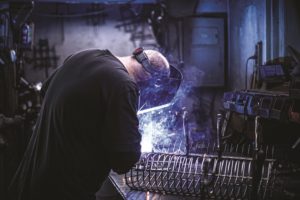
“This design is a Virginia Harvester,” says Hennion, gesturing to the rake on his bench. It’s an older design, not one of the company’s usual products. “People got wind we’re making them,” says Ribb, who adds that orders have been stacking up for this narrower version of their standard bull rake.
Ribb rakes are used to harvest hardshell clams like quahogs. The rakes, attached to long aluminum poles, have sharp teeth that dig into the sand to collect clams from beneath the surface. It’s not uncommon to see fishermen bent slightly backward, rhythmically dragging bull rakes through shallow water on the tidal flats in Wellfleet and other Cape Cod towns where clams are seeded and harvested.
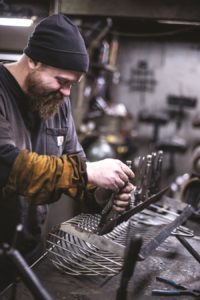
To make the Virginia Harvester, Hennion referred to an old prototype. He carefully measured the angles of the tang and the tooth bar. “He’s very precise,” says Ribb, which is necessary in this line of work. “If the geometry is wrong, it won’t fish right.”
Unlike the prototype, Hennion’s version is made of stainless steel, a material that he describes as tough to work with. “It has a memory,” he says. “When you bend it, it wants to go back to its original shape.”
Maggie Ribb, Kersti’s mother and the owner of the company, describes Hennion’s work as “beautiful.”
Maggie manages the business and takes the orders, while production is left to Kersti and Hennion. The two are longtime friends who met as teenagers going to concerts at the VFW.

Kersti says her mother will talk to a customer 10 times to get one order straightened out. That happens often, according to Hennion, because many of the commercial rakes they make are custom orders. “Everyone has their own idea of what they need,” he says.
He executes the orders Maggie receives, modifying any number of elements, including spacing, angles, and the type of teeth. He and Kersti made 20,000 teeth last year from high-carbon steel — each one handled five separate times in the production process.
The commitment to custom work goes back to the company’s founder, Maggie’s late husband, Ron Ribb. He started the company in 1975 while working as a fisherman in Chatham. A notebook filled with drawings and instructions for making the rakes guides the new generation of welders.
“This is all his handwriting,” says Maggie, flipping through the yellowed pages of the notebook. “It’s our bible,” says Kersti. “We use it every day.”
Barbara Austin, who has been harvesting shellfish in Wellfleet since 1985, approached Ron to make her a custom rake after she got her hand stuck in a culling machine and needed surgery. “I had a pin sticking out of my pinkie and I couldn’t bend my hand,” says Austin. Ron made her a harness rake that she could move with her body weight, just steering it with her hands. “I remember dancing around the shop with Ron as he taught me how to use the harness,” she says. “A week later, he was gone. It was devastating.”
That was 1996. Since then, Maggie has continued her husband’s business while also working as a church organist. Austin has continued buying rakes from the company, accumulating about 15 over the years. “I’ve stuck with the harness rake,” she says, noting that it is lighter and fits her frame better than a standard rake. “They try to help the commercial guys out,” she adds. “When you have a broken rake or need a new handle, they’ll set aside what they’re doing so you don’t lose digging time.”
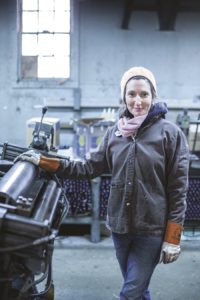
Like Austin, Maggie and Kersti Ribb are outliers as women in male-dominated businesses. “There are not as many barriers as you might expect,” says Kersti, though she admits some people are surprised to see her welding. Her mother occasionally gets calls asking for “the guy” or “the owner,” but that doesn’t faze her.
Kersti was initiated into the family business early, helping out on weekends. But she never thought she’d make rake welding her career. She worked in psychiatric research after college, received a master’s degree in nursing from Yale, and stayed in New Haven for five years working as a psychiatric nurse practitioner.
“I got burnt out,” Kersti says. She returned to the Cape in 2017 and thought she would help her mother with organization but soon found herself engaged in manufacturing. She improved her welding skills with lessons from Shawn Enos, who had previously taught at Cape Cod Tech. “I like not being in a hospital all the time,” says Kersti of her new career. “I like to interact with materials.”
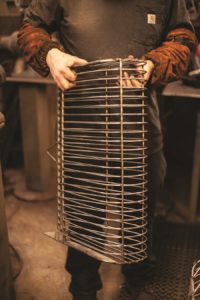
Kersti does high-skill aluminum welding and fabricating, working mainly on small recreational rakes. Available locally at the Goose Hummock Shop in Orleans and Bayberry Gardens in Truro for about $100, they make up the bulk of the company’s volume: around 2,500 rakes a year. Hennion crafts the 200 or so commercial rakes, which range in price from $250 to $500.
To make a recreational rake, Kersti takes down an eighth-inch iron bar from a wall lined floor-to-ceiling with bars of varying dimensions. After cutting the lengths she needs, she places them in a jig, spot-welding them to hold the horizontal and vertical pieces in place.
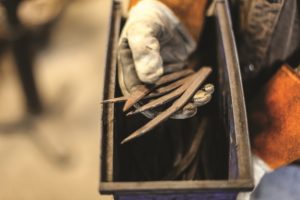
The jig, along with most of the equipment in the shop, was purchased in the early ’80s by her father from a rake producer who was closing on Long Island. “This jig has to be at least 50 years old,” she says.
After spot-welding the pieces together, she takes the grid to another station for a finish weld. Once the grid is secure, she bends it into shape on a hand bender, which looks like a large rolling pin. The commercial rakes are bent into shape by a hydraulic press at the far end of the shop. At the end of one table there’s an oddly shaped log, used to bend a particular model at just the right angle.
The finishing touches for a recreational rake include affixing a wooden handle, supplied by a producer in Maine, and cleaning. “I used to do all of the cleaning of rakes before they went to retail,” says Maggie. Now that falls to Kersti, who also loads them up for delivery, which she does herself.
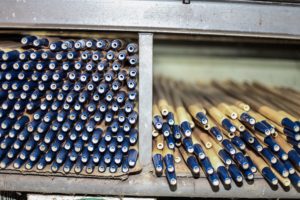
“We deliver everything,” says Kersti. “We’ll get on the ferry to Long Island. I love going to see the store owners every year. It doesn’t even feel like you’re doing business,” she adds.
“People are doing things in such an impersonal manner,” adds Maggie. “We’re trying to resist that.” There is no shopping cart on the Ribb website. “You have to call and order from me,” says Maggie. “I enjoy the phone. You hear the customer’s story.”
“Our products convey a sense of value,” says Kersti after her mother complains about Chinese-made rakes new to the market. “I’ve had Chinese rakes in here that I could bend with my bare hands,” Maggie says.
“This really is a craft,” says Kersti. A Ribb rake is a handmade item to be appreciated, she adds. “One of these you could use for decades if they’re well cared for.”



